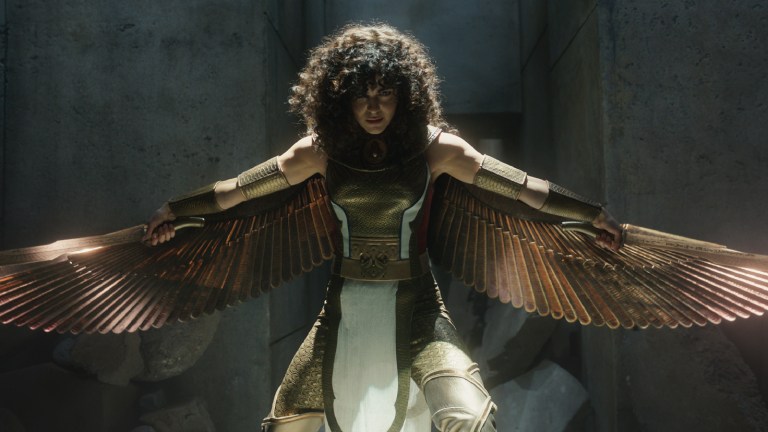Moon Knight: The Secret Origin of Scarlet Scarab
Director Mohamed Diab explains how Moon Knight turned Layla El-Faouly into the Scarlet Scarab.

This article contains Moon Knight spoilers.
One of the best moments in Marvel’s recently ended Moon Knight series is when Layla El-Faouly (May Calamawy) agrees to become the temporary human avatar for the Egyptian goddess Taweret. This happens during a critical juncture in the season finale, when Marc Spector/Steven Grant/Moon Knight (Oscar Isaac) and the god Khonshu need all the help they can get to defeat the goddess Ammit, who has been released by Arthur Harrow (Ethan Hawke) to bring death to much of humanity.
Layla emerges in an awesome costume, with fearsome powers, and has since been dubbed by Marvel as the Scarlet Scarab. She and Taweret do indeed join the battle, and while Harrow and Ammit are finally defeated (thanks in part to the efforts of Jake Lockley, the third personality in Spector’s body), Layla’s future as the avatar of Taweret and as a superhero remains unclear.
The character of Layla, who is Marc Spector’s wife and fellow adventurer, is original to the Disney+ series, although she was at least partially inspired by Marlene Alraune, his lover and eventual wife in the comics. The Scarlet Scarab name is not related at all to Moon Knight in the comics, with the original male version of the character appearing in Thor and The Invaders books.
In fact, the character of Layla in Moon Knight was initially not going to be Egyptian herself, according to series director and executive producer Mohamed Diab. “First of all, I have to give it to the writers,” Diab tells us. “They came up with the idea of making Layla Egyptian…When me and Sarah [Goher, Diab’s wife and creative partner] came along, we definitely gave some Egyptian input. When May came along, she became the character’s best lawyer and she had great input in her as well.”
Diab doesn’t remember if it was “Marvel or the writers” who came up with the idea of giving Layla her superhero moment, but the idea of putting the world’s first Egyptian superhero onscreen was an instant home run for him. “This [was] the best idea in the world,” he says proudly. “Egyptians today are dealing with the show and Layla as feeling like they’re represented and they are being seen — it feels like this is our Black Panther. Everyone in the show is like a hero in Egypt right now.”
The director continues, “And it’s not just Egypt. It’s the Middle East, people in South Asia…everything feels similar, so people feel represented. My daughter, when she was five, she wanted to straighten her curly hair because she never found someone onscreen that looks like her. But today, I think this is going to affect a lot of girls and a lot of even boys in places around the world.”
The power of that image hits home during a brief moment when a young girl sees Layla in action on the street and asks her directly if she is an Egyptian superhero. “I am,” Layla responds before she propels herself and her shining golden wings back into the battle with Ammit. It’s a fleeting but intensely effective moment, the climax of Moon Knight’s carefully curated and detailed exploration of Egyptian culture and society minus the usual clichés rampant in Hollywood depictions of the Middle East.
“I wish one day we can play this on a big screen,” says Diab. “It’s such a historical moment. There are always those tropes that Arab women are submissive. But Layla represents the reality, which is that Arab women – and actually women in Third World countries who are living in harsh conditions — this makes them stronger. That was something very important to portray. Even if she didn’t end up being a superhero, she would have still been a very strong character.”
As we mentioned earlier, Layla’s future is a question for now – not just because her joining with Taweret was temporary, but because we don’t know if there will be a second season of Moon Knight. We do know this: if there is a Season 2, we hope to see the Scarlet Scarab representing Egypt in the pantheon of Marvel superheroes once again.
All six episodes of Moon Knight are streaming on Disney+ now.
